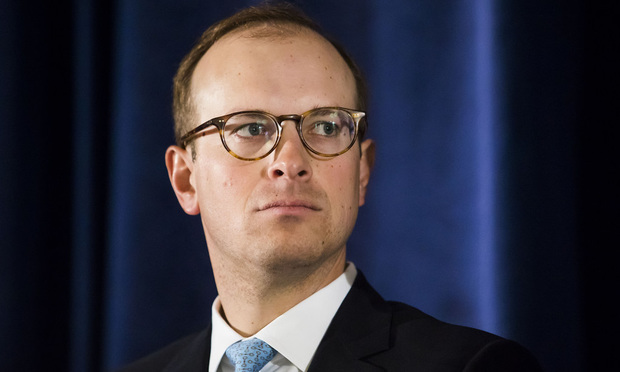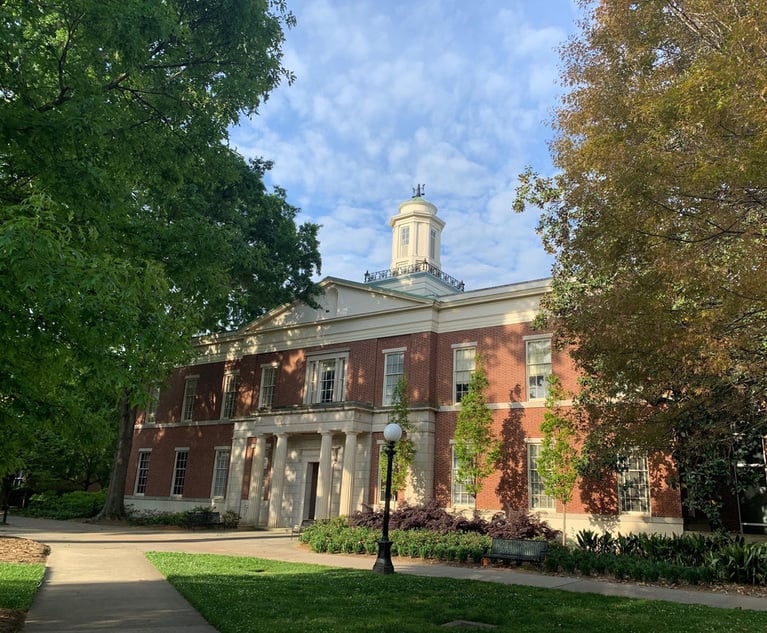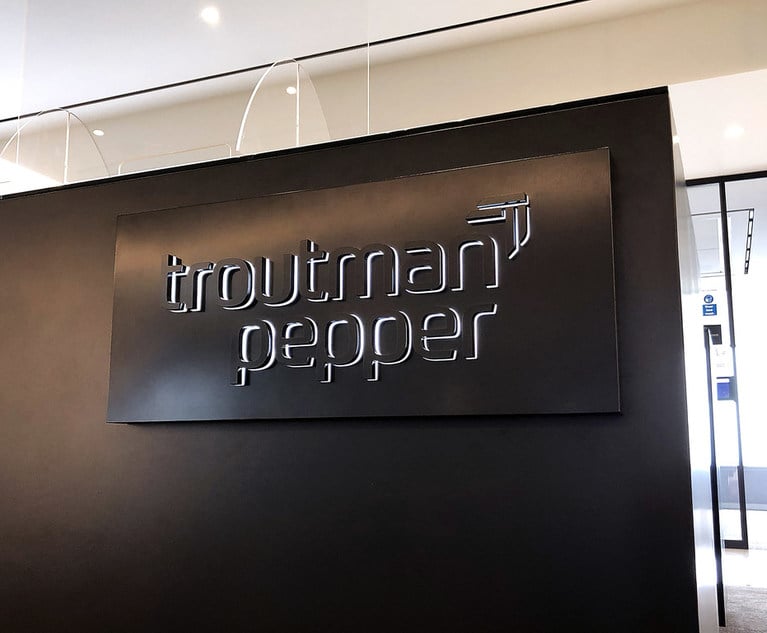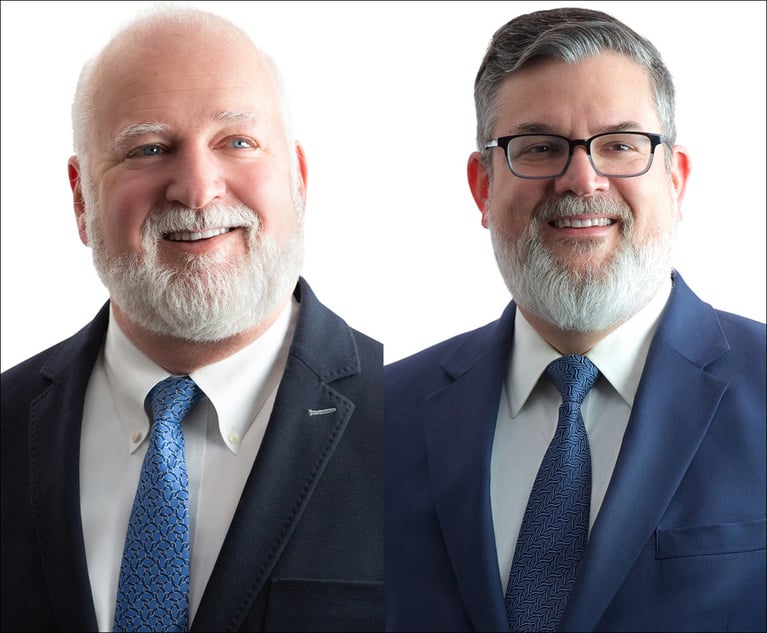DC Appellate Lawyer to Defend Georgia Abortion Ban
Jeffrey M. Harris joined the litigation boutique Consovoy McCarthy as a partner in 2018 after working for President Donald Trump. Worth mentioning: He also clerked for U.S. Supreme Court Chief Justice John Roberts Jr.
July 24, 2019 at 10:01 AM
4 minute read
 Jeffrey Harris (Photo: Diego M. Radzinschi/ALM)
Jeffrey Harris (Photo: Diego M. Radzinschi/ALM)
Georgia Attorney General Chris Carr has retained Jeffrey M. Harris of Consovoy McCarthy from Washington, D.C., to defend the state in a constitutional challenge to an abortion ban set to take effect Jan. 1.
Carr has retained Harris as a special assistant attorney general for the lawsuit, Communications Director Katie Byrd said Tuesday. Other than that, Carr declined to comment, as did Harris.
Harris joined the litigation boutique Consovoy McCarthy as a partner in 2018 after working for President Donald Trump. Harris served as associate administrator of the Office of Information and Regulatory Affairs. He was second in charge of a 50-person staff within the Executive Office of the President reviewing federal regulatory actions and coordinating regulatory policy for the government, according to his bio on the firm website. Previously, Harris was a partner at Kirkland & Ellis, where his practice focused on the U.S. Supreme Court, appellate and complex litigation.
Harris clerked for Chief Justice John Roberts Jr. as well as D.C. Circuit Court of Appeals Judges David Sentelle and Laurence Silberman, according to his firm bio. He is a graduate of Georgetown University and Harvard law school.
SisterSong Women of Color Reproductive Justice Collective, the Feminist Women's Health Center, Planned Parenthood and other clinics and physicians have sued Carr along with Georgia Gov. Brian Kemp and prosecutors around the state in the U.S. District Court for the Northern District of Georgia. The complaint alleges the abortion ban created by House Bill 481 is unconstitutional and violates U.S. Supreme Court precedent. The case has been assigned to Judge Steve Jones.
On Tuesday, the groups filed a brief in support of a motion for preliminary injunctive relief. “Our first priority is to block this law from going into effect during the pendency of this litigation,” plaintiffs' counsel ACLU Georgia Legal Director Sean J. Young said.
The document filed Tuesday said the “balance of harm tips decidedly” in favor of SisterSong and the other advocacy groups challenging the ban.
“While plaintiffs and their patients and members will suffer numerous irreparable harms without an injunction, defendants will suffer no injury whatsoever; plaintiffs' requested relief will simply preserve the status quo of nearly five decades,” the motion said.
The abortion ban in Georgia is similar to those that have passed in a dozen states. None has taken effect, and all have been blocked by federal judges. Appeals are pending. The Georgia case would go to the U.S. Court of Appeals for the Eleventh Circuit, which has already rejected requests to uphold later bans in two other cases—while expressing disapproval of the procedures at issue and Supreme Court precedent. Proponents of the bans have made clear their ambition to prompt the Supreme Court to overturn its landmark holding in Roe v. Wade.
Emphasizing the importance of the case, ACLU Georgia Executive Director Andrea Young quoted Justice Sandra Day O'Connor in Planned Parenthood v. Casey affirming Roe v. Wade: “The ability of women to participate equally in the economic and social life of the Nation has been facilitated by their ability to control their reproductive lives.”
The case is SisterSong Women of Color Reproductive Justice Collective v. Brian Kemp, Civil Action No.: 1:19-cv-02973-SCJ.
This content has been archived. It is available through our partners, LexisNexis® and Bloomberg Law.
To view this content, please continue to their sites.
Not a Lexis Subscriber?
Subscribe Now
Not a Bloomberg Law Subscriber?
Subscribe Now
NOT FOR REPRINT
© 2025 ALM Global, LLC, All Rights Reserved. Request academic re-use from www.copyright.com. All other uses, submit a request to [email protected]. For more information visit Asset & Logo Licensing.
You Might Like
View All
28 Firms Supporting Retired Barnes & Thornburg Litigator in Georgia Supreme Court Malpractice Case
7 minute read
Troutman Pepper Says Ex-Associate Who Alleged Racial Discrimination Lost Job Because of Failure to Improve
6 minute read

Law Firms Expand Scope of Immigration Expertise Amid Blitz of Trump Orders
6 minute readTrending Stories
- 1Retired NY Chief Judge Jonathan Lippman Playing Key Role in Advancing 'Weinstein Bill'
- 2How I Made Partner: 'Take Every Opportunity to Get Involved in the Business Side of the Firm,' Says Alyssa Domzal of Ballard Spahr
- 3People in the News—Feb. 5, 2025—Eckert Seamans, Rawle & Henderson
- 4Librarian's Termination Violated First Amendment Protections, Lawsuit Claims
- 5Choice-of-Law Issues as the UCC 2022 Amendments Come into Effect
Who Got The Work
J. Brugh Lower of Gibbons has entered an appearance for industrial equipment supplier Devco Corporation in a pending trademark infringement lawsuit. The suit, accusing the defendant of selling knock-off Graco products, was filed Dec. 18 in New Jersey District Court by Rivkin Radler on behalf of Graco Inc. and Graco Minnesota. The case, assigned to U.S. District Judge Zahid N. Quraishi, is 3:24-cv-11294, Graco Inc. et al v. Devco Corporation.
Who Got The Work
Rebecca Maller-Stein and Kent A. Yalowitz of Arnold & Porter Kaye Scholer have entered their appearances for Hanaco Venture Capital and its executives, Lior Prosor and David Frankel, in a pending securities lawsuit. The action, filed on Dec. 24 in New York Southern District Court by Zell, Aron & Co. on behalf of Goldeneye Advisors, accuses the defendants of negligently and fraudulently managing the plaintiff's $1 million investment. The case, assigned to U.S. District Judge Vernon S. Broderick, is 1:24-cv-09918, Goldeneye Advisors, LLC v. Hanaco Venture Capital, Ltd. et al.
Who Got The Work
Attorneys from A&O Shearman has stepped in as defense counsel for Toronto-Dominion Bank and other defendants in a pending securities class action. The suit, filed Dec. 11 in New York Southern District Court by Bleichmar Fonti & Auld, accuses the defendants of concealing the bank's 'pervasive' deficiencies in regards to its compliance with the Bank Secrecy Act and the quality of its anti-money laundering controls. The case, assigned to U.S. District Judge Arun Subramanian, is 1:24-cv-09445, Gonzalez v. The Toronto-Dominion Bank et al.
Who Got The Work
Crown Castle International, a Pennsylvania company providing shared communications infrastructure, has turned to Luke D. Wolf of Gordon Rees Scully Mansukhani to fend off a pending breach-of-contract lawsuit. The court action, filed Nov. 25 in Michigan Eastern District Court by Hooper Hathaway PC on behalf of The Town Residences LLC, accuses Crown Castle of failing to transfer approximately $30,000 in utility payments from T-Mobile in breach of a roof-top lease and assignment agreement. The case, assigned to U.S. District Judge Susan K. Declercq, is 2:24-cv-13131, The Town Residences LLC v. T-Mobile US, Inc. et al.
Who Got The Work
Wilfred P. Coronato and Daniel M. Schwartz of McCarter & English have stepped in as defense counsel to Electrolux Home Products Inc. in a pending product liability lawsuit. The court action, filed Nov. 26 in New York Eastern District Court by Poulos Lopiccolo PC and Nagel Rice LLP on behalf of David Stern, alleges that the defendant's refrigerators’ drawers and shelving repeatedly break and fall apart within months after purchase. The case, assigned to U.S. District Judge Joan M. Azrack, is 2:24-cv-08204, Stern v. Electrolux Home Products, Inc.
Featured Firms
Law Offices of Gary Martin Hays & Associates, P.C.
(470) 294-1674
Law Offices of Mark E. Salomone
(857) 444-6468
Smith & Hassler
(713) 739-1250






